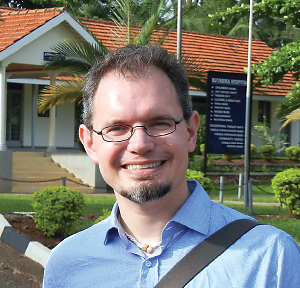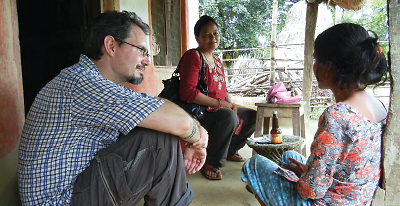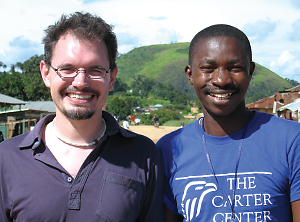Psychiatrist on Mission to Help Mentally Ill People in Poor Countries
Abstract
Brandon Kohrt, M.D., Ph.D., studied to become a medical anthropologist and psychiatrist. With his formal education completed, he sees his destiny as helping people in low-income countries.

Brandon Kohrt, M.D., Ph.D., visits Butabika Psychiatric Hospital, Uganda’s largest inpatient psychiatric facility, with more than 500 beds.
It’s a long way from the bucolic town of Paupack, near Pennsylvania’s Pocono Mountains, to the dusty, polluted city of Kathmandu, Nepal.
But one might view it as a trajectory that 38-year-old Brandon Kohrt, M.D., Ph.D., has selected. Indeed, he has traveled back and forth between the United States and Nepal numerous times during the past 17 years.
When he was an undergraduate at the University of Southern California (USC), Kohrt wanted to become a medical anthropologist. So he spent one of those years in Nepal, researching cross-cultural concepts and manifestations of mental illness. Yet “seeing people living with mental illness, but not getting any treatment, made me want to pursue psychiatry training as well as social-science training,” the soft-spoken Kohrt explains.
Thus, after he graduated from USC in 1998, he entered a combined medical anthropology and medical school program at Emory University. He received a Ph.D. in medical anthropology and an M.D. in 2009. From 2009 to 2011, he did a psychiatry residency at Emory and then two additional residency years at George Washington University, completing his residency in June. And throughout his studies, he undertook various mental health projects in Nepal that were sponsored by Fulbright fellowships, the National Institute of Mental Health, and the nongovernmental organization Transcultural Psychosocial Organization (TPO) Nepal.
Teachers Rejected Former Child Soldiers
For example, when Nepal’s decade-long war between the monarchy and Maoists ended in 2006, he and colleagues at TPO Nepal evaluated the mental health of children who had served as soldiers in the Maoist army. They found that many suffered from anxiety, depression, or posttraumatic stress disorder (PTSD) and that many also reported that discrimination against them back home was even more traumatic than what they had experienced as child soldiers. “Teachers would call them ‘little Maoists,’ force them to sit on the floor and mock them, and sometimes not even let them into the classroom because they were afraid of them,” Kohrt recalls.

Brandon Kohrt, M.D., Ph.D., and colleague Maya Shrestha interview a former child soldier in Nepal. Many of the former child soldiers suffered from anxiety, depression, posttraumatic stress disorder, and discrimination after they returned home.
“So what we did,” Kohrt continues, “was to train community psychosocial workers to meet with the teachers and ask them to discuss their fears and concerns about these children. The community psychosocial workers then brought the teachers and former child soldiers together. The children said that the most important thing about coming home was to be able to reenter school. Slowly the teachers improved their treatment of the youngsters, and when they did so, the youngsters’ classmates and other members of the community did as well.”
Kohrt and his colleagues also studied the impact of the intervention on the former child soldiers’ mental health. A year after the intervention had been implemented, the children’s mental health was comparable to that of other children in the communities, they found.
Work in War-Torn African Nation
Liberia is a country located on the west coast of equatorial Africa. It contains luscious growth during the rainy season, yet strong, dusty winds from the Sahara Desert rake it from November through March.

Brandon Kohrt, M.D., Ph.D., and Seidu Swaray of the Liberian Association for Psychosocial Services are conducting a needs assessment for the Carter Center in Lofa County, Liberia.
A 14-year civil conflict, which ended in 2003, left Liberia scarred by violence and carnage and with many of its citizens suffering from PTSD. Building upon two decades of efforts to foster peace and democracy in Liberia, the Carter Center, headquartered in Atlanta, launched a five-year initiative in 2010 to help the Liberian government create a sustainable mental health system. The initiative includes policy implementation and service delivery, training and capacity building, advocacy, anti-stigma programs, and research.
Kohrt had “the good fortune,” he says, of being at Emory University in Atlanta in 2008 and 2009, when the initiative was being designed, and was able to participate in that process. “And since 2010, I have been going back and forth to Liberia, working primarily in the area of researching programs to reduce stigma, but also to support family involvement in mental health care and recovery.”
For instance, mental illness is highly stigmatized in Liberia, he points out. Many Liberians believe that mental illness is caused by witchcraft and could be contagious. In 2011, Kohrt and his colleagues attempted to reduce such stigma by using radio campaigns, bumper stickers, and various other awareness-raising activities. The results were disappointing but highly informative about the limitations of using standard approaches to stigma reduction. After that, they supported development of advocacy groups of individuals living with mental illness and their family members. These individuals are now an integral part of the antistigma campaigns directed toward specific groups, including police, journalists, and pharmacists. It looks as if this tack is going to be more effective, Kohrt reports.
Dialogue Comes First
Working in Nepal and Liberia has its challenges, Kohrt acknowledges. “Often you are perceived as someone who has a lot of resources at your disposal, which can lead to superficial agreement with whatever ideas you present. So what my colleagues and I do before designing an intervention is attempt to foster dialogue with community leaders, religious leaders, and traditional healers to identify people’s needs, concerns, and expectations. And only after we’ve taken this participatory approach do we design an intervention.”
Language has been another challenge, Kohrt points out. He and his collaborators have spent years documenting how emotions, cognitions, and bodily sensations are described in the Nepali language, as well as in Mongolian, Haitian Kreyol, and now Liberian English. Traditionally anthropologists and psychiatrists argued that the division between mind and body is a product of Western thinking. Kohrt and his colleagues have found that this is not the case. Cultures from Asia to Africa to the Caribbean have divisions of the heart, mind, and body that create interesting opportunities for the cultural adaptation of psychotherapy and psychoeducation, Kohrt has found.
Balancing the hurdles, of course, are the rewards that Kohrt receives from his work in Nepal and Liberia. “Working with people in these countries as they develop new research and clinical skills through our collaborations has been very gratifying,” he says. “I had the privilege of helping a man recover from mental illness in a remote Himalayan village, and he is now running a project with us.”
Work in Uganda May Be on Horizon
Now that Kohrt has completed his education, he is becoming an assistant professor of global health and psychiatry at the Duke Global Health Institute of Duke University and will be conducting more international mental health work in Liberia and Nepal and possibly in Uganda as well.
William McDonald, M.D., director of psychiatry and behavioral sciences at Emory University, has known Kohrt since Kohrt was in medical school. “He is set on a path to make an important impact on mental health care for cross-cultural populations and training for young professionals in cross-cultural mental health,” McDonald observes.
“At this early stage in his career, Dr. Kohrt is already considered a leader in the field of global mental health research,” attests James Griffith, M.D., interim chair of psychiatry at George Washington University. “But in addition, he is a remarkably good clinician. His warmth, openness, and absence of pretense enable him to quickly connect with patients. Moreover, the scope of his skills using language and relationship enable him to build alliances with some of the most difficult patients imaginable, who then begin making visible changes in their lives.” ■
From 2006 to 2008, Kohrt and a friend made a documentary film about children who served in Nepal’s civil war titled “Returned: Child Soldiers of Nepal’s Maoist Army.” It won the American Anthropological Association’s award for best student documentary and has played in several film festivals. Excerpts of the film can be viewed at http://www.nepaldocumentary.com. To watch a video interview of Kohrt about his experiences, go to http://youtu.be/BltwpifIdkE.
Considerable interaction with traditional healers in Nepal, Mongolia, and Liberia has given Brandon Kohrt, M.D., Ph.D., the opportunity to compare traditional healing with modern American psychiatry.
Both forms of healing are based on the belief that the treatment will help and on the collaboration between the healer and the patient, he explains. And when the belief and the collaboration—the doctor-patient alliance—are strong, both forms of healing can be effective, he adds. “Understanding how traditional healing works has led me to realize that there are commonalities with the techniques that we use.”
However, this is not to say that people in Nepal and Liberia shouldn’t have access to modern American psychiatric treatments, Kohrt emphasizes. The ideal, he says, is to make both traditional healing methods and psychotherapy and psychotropic medications available. Then patients and their families can choose the combination of treatments that is most culturally and personally compelling for them.



